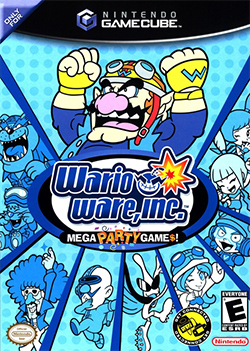
WarioWare, Inc.: Mega Party Game$! is a party video game for the GameCube. A remake of WarioWare, Inc.: Mega Microgames!, and the second installment in the WarioWare series, the game translates the "microgame" gameplay of Mega Microgames! to be playable in a multiplayer environment. It comes with eight special multiplayer modes for up to four players that all involve the known microgames in some way.

Super Monkey Ball: Banana Blitz is a platform game developed and published by Sega, the seventh title in the Super Monkey Ball series, following Super Monkey Ball Adventure. It was released as a launch title for the Wii system on November 19, 2006, in North America, December 7 in Australia and December 8 in Europe.

WarioWare: Smooth Moves is a party video game developed by Nintendo and Intelligent Systems and published by Nintendo on the Wii. It was released in Japan in December 2006, and in Europe, North America, and Australia in January 2007. It is the fifth game in the WarioWare series of games, and the only game in the series to be physically released for the Wii. Like its predecessors, WarioWare: Smooth Moves is built around a collection of microgames that last about five seconds each, and which require that the player hold the Wii Remote in specific positions. The game offers the microgames to the player in rapid succession, by first instructing the player to hold the Wii Remote in a specific manner, and then showing them the microgame. The microgames are divided into several stages, each of which loosely connects the microgames with the help of a story. Additionally, this was the first spin-off Mario game to be released for the console.

Boogie is a music video game developed by Electronic Arts for the Wii, PlayStation 2 and Nintendo DS. Being touted as a party-game, it enables players to create their character, then use the Wii Remote and a microphone to sing and dance through it. Each song within the game can be performed either as a karaoke or as a dancing game. The game is based around an alien theme. It was one of the first games released in Brazil for the Wii. Although anticipation was high for the game, it received mixed reviews.
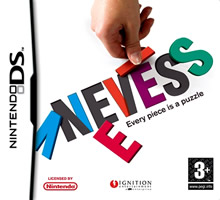
Neves, known in Japan as Hamekomi Lucky Puzzle DS, is a puzzle video game developed by Yuke's Media Creations for the Nintendo DS, based on the Japanese Lucky Puzzle, a tangram-like dissection puzzle. In the game, players use the stylus to move, rotate and flip pieces on the DS's touch screen to clear puzzles. It features over 500 different puzzles from which to choose.
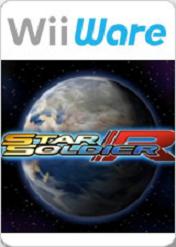
Star Soldier R is a futuristic scrolling shooter video game developed by Hudson Soft, and is the seventh installment in the Star Soldier series. The game features classic Star Soldier gameplay combined with 3D graphics.
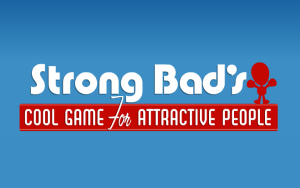
Strong Bad's Cool Game for Attractive People is an episodic graphic adventure developed by Telltale Games and based on the Homestar Runner web cartoon, with Strong Bad as the lead character. A total of five episodes were released for Microsoft Windows and WiiWare between August 11, 2008, and December 15, 2008. It was released on the PlayStation 3 in North America on December 21, 2010, and in other regions at a later time. There is also an OS X version.

Tetris Party is a puzzle video game by Hudson Soft for WiiWare. An installment of the Tetris series, the game supports the use of Miis and the Wii Balance Board, and features both local and online multiplayer in addition to several single-player modes unique to the game.

The Incredible Maze is a WiiWare game developed and published by Digital Leisure. The game is compatible with both the Wii Remote and the Wii Balance Board.

Bubble Bobble Plus! and Bubble Bobble Neo! are remakes of the 1986 arcade game Bubble Bobble. The games were developed and published by Taito. Bubble Bobble Plus! was released for WiiWare in Japan on February 10, 2009, in the PAL regions on April 10, and in North America on May 25, while Bubble Bobble Neo! was released on the Xbox Live Arcade download service for the Xbox 360 in Japan on August 5, 2009 and in North America on September 16 of the same year.

Rotohex is a Nintendo video game for the Wii's WiiWare service. It is a remake of the Japan-only bit Generations title Dialhex. It was released as WiiWare in North America on October 27, 2008.

Mr. Driller W is a 2009 puzzle video game developed and published for the WiiWare service by Namco Bandai Games. The eighth entry in the Mr. Driller series, gameplay revolves around clearing each level by destroying, or "drilling", large formations of colorful blocks. Players have an oxygen meter that acts as a time limit, and constantly depletes; air is replenished by collecting air capsules, and is depleted further by destroying brown "X" blocks.

Puzzle Bobble Plus!, known in North America as Bust-A-Move Plus!, and in Japan as Puzzle Bobble Wii, is a video game developed by Taito for WiiWare. It was first released in Japan on April 7, 2009, and later in the PAL regions on June 26, and in North America on July 6.

Driift Mania is a WiiWare racing game developed by a French team and released by Konami. It was released in the PAL regions on July 31, 2009. and in North America on September 28, 2009.

Super Monkey Ball: Step & Roll is a platform video game developed and published by Sega for the Wii. It was released in February 2010 worldwide.

Frogger Returns is a game for the PlayStation 3, Nintendo DSi, and Wii by American developer Hijinx Studios. This game is purchased from the PlayStation Store, and it was available on the Wii Shop Channel before the service ended. The game was also released as DSiWare on May 18, 2010.

Wii Party is a party video game developed by NDcube and published by Nintendo for the Wii video game console. The game heavily borrows game play elements from the Mario Party series, another Nintendo franchise. It is also the first game in the Wii series that Shigeru Miyamoto did not produce. The game was released in Japan on July 8, 2010, in North America on October 3, 2010, in Australia on October 7, 2010, and in Europe on October 8, 2010. Wii Party was revealed by Satoru Iwata in a Financial Results Briefing on May 7, 2010. It received mixed to positive reviews from critics and sold 9.35 million copies worldwide as of September 2021. A sequel, Wii Party U, was released for the Wii U on October 25, 2013.

Michael Jackson: The Experience is a music video game based on Michael Jackson's songs. It was developed and published by Ubisoft, and was released on 23 November 2010 in North America, 25 November 2010 in Australia and 26 November 2010 in Europe for the Nintendo DS, PlayStation Portable, and Wii. It was also released on 12 April 2011 in North America, 14 April 2011 in Australia and 15 April 2011 in Europe for PlayStation 3's PlayStation Move and Xbox 360's Kinect. The Japanese release on 8 December 2011 only revised the PlayStation 3, Xbox 360, and Wii consoles. The game features many of Michael Jackson's hits, such as "Bad", "Thriller", "Beat It", "Billie Jean", "Smooth Criminal", "Black or White", "The Way You Make Me Feel", etc. However, some songs like "Man in the Mirror" and "P.Y.T. " are excluded. Initial launches of the game included a limited edition replica of Jackson's sequined glove. It was later released for the Nintendo 3DS on 7 November 2011 in North America and 11 November 2011 in Europe, for iPhone and iPad on 7 December 2011 in North America and for PlayStation Vita on 15 February 2012 in North America, 22 February 2012 in Europe and 23 February 2012 in Australia. It was announced that the game would be released on Mac OS X, and iPad 2. The game sold 2 million units in two months, not including Japanese sales, making it one of the best-selling Wii title games.

Family Card Games is a video game developed by Arc System Works for the Wii. It was released as a WiiWare title in Japan on June 6, 2009, on November 11, 2009, in North America and on August 11, 2010, in PAL territories at a cost of 500 Wii Points. The game is the 7th in its series and brings an end to the long line of video games branded as Okiraku in Japan and Family games in North America and PAL territories, such as Family Table Tennis and Family Glide Hockey.
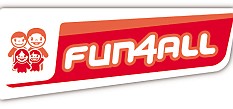
Fun4All is a brand made by Activision for their line of family-friendly video games for the Wii. The brand launched in Europe on February 13, 2009 and is exclusive to PAL territories. Activision planned to launch a similar brand in North America called "Wee 1st", but decided later to name it "Designed Exclusively for Wii". There are currently six titles that are a part of the Fun4All-brand.


















